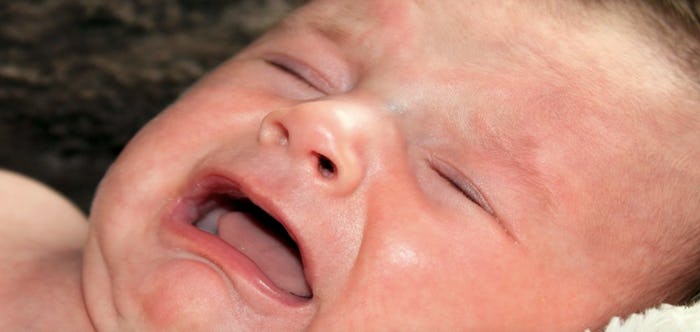There are few things worse in this world than trying to help a colicky baby, especially since doctors don't seem to have any idea what causes it and what the best way to soothe it is. Well, there might finally be some hope. Or at least another thing to try to help your colicky baby. According to a new report released by the American Academy of Pediatrics, a probiotic known as Lactobacillus reuteri DSM17938 can cut down on colic symptoms in breastfed babies.
Formula moms, don't fret — it's not just for breastfed babies, but only one of the four double blind studies done by researchers included formula babies, so there just isn't enough data to make a conclusion. However, the studies show that after two weeks of taking the probiotic, 60 percent of the breastfed babies improved, which was around a 50 percent decrease from the infants' baseline crying. After 21 days, two thirds of them had improved.
Probiotics regulate the amount of bacteria in a person's gut, and previous studies have shown that the same one can increase a baby's bowel movements. Doctors don't know what exactly causes colic, but they do know that it has something to do with the digestive system, which could explain why it worked in this study.
But don't go rushing out just yet to get some, even though you're little one is totally driving you up the wall right now. I'm sorry I don't have better news for you.
According to the accompanying article in Pediatrics, it's too soon for the AAP to recommend Lactobacillus reuteri to parents looking to soothe a colicky baby. Researchers wrote that the studies are still inconclusive:
Three studies of breastfed infants with colic demonstrated the probiotic to be effective. In contrast, one study of both breastfed and formula-fed infants with colic, the largest so far, concluded it was ineffective even for those who were breastfed.
Also, the rates of improvement over time for babies that don't take a probiotic is similar to the rates of this study, which means it's hard to tell if it's the probiotic or just a miracle that your baby stops fussing and crying all day and night. Research shows that without a probiotic, the instances of colic drop 20 percent in the first six week and then down to 11 percent by eight or nine weeks, which is an actual lifetime if you're living in the same house as said baby, according to HuffPost.
Of course, none of this shows that probiotics are harmful, though the benefits of them are widely debated among medical professionals. The best thing you can do is talk to your doctor and see what they think. Based on their recommendation, you can make a decision about what's going to work best for your family. Because make no mistake: it's not just about making the baby comfortable when its colicky, though of course, that's a priority. Your mental health is at risk, too.
A study done by the National Institute of Medicine found that a colicky baby affects the entire family dynamic. The researchers wrote:
The families of previously colicky infants demonstrated more dissatisfaction with the arrangements of daily family responsibilities and with the amount of both leisure time and shared activities. The children in the colic group had more sleeping problems and more frequent temper tantrums (at 3 years of age) than the control group.
So not only does colic affect your family during the infant stage, but it makes the Terrible Threes worse, too. So it's definitely worth pestering your doctor and talking to other parents about their tips and tricks about soothing a colicky kid, especially since its a condition that still eludes medical researchers.
Whether or not you choose a probiotic or some other way, good luck out there.
Check out Romper's new video series, Romper's Doula Diaries:
Watch full episodes of Romper's Doula Diaries on Facebook Watch.
